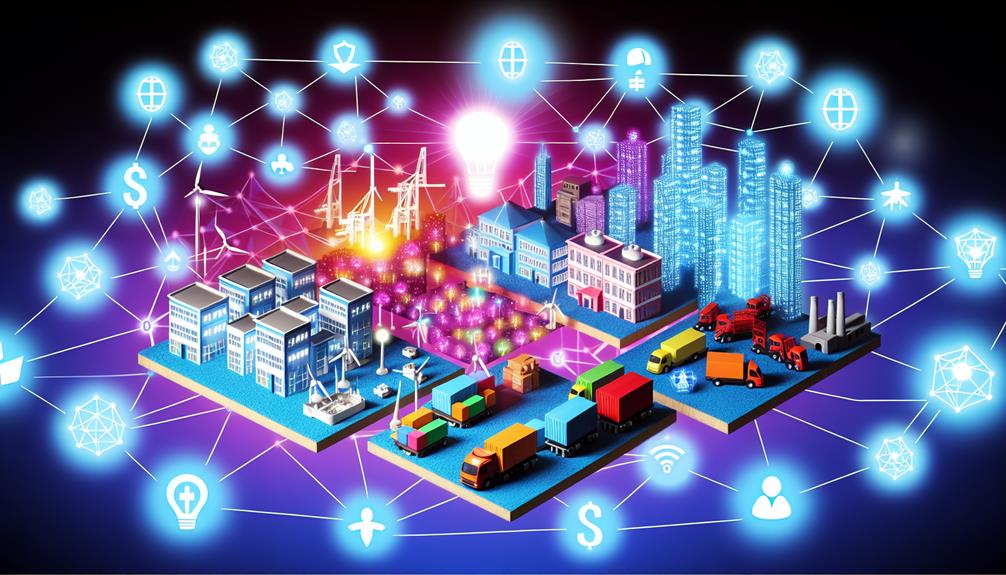You might be wondering if blockchain is dead, especially with the hype around cryptocurrencies fading. However, the reality is more nuanced. While there are undeniable challenges—like scalability and regulatory barriers—many industries are finding innovative ways to utilize blockchain technology. Major corporations are exploring its potential, indicating that it may not be as moribund as some suggest. So, what does this mean for the future of blockchain? The answer might surprise you, as it reveals a landscape filled with possibilities that could redefine our understanding of this technology.
Current State of Blockchain

As the technology landscape continues to evolve, the current state of blockchain reflects a complex interplay of innovation, regulation, and market dynamics. You'll notice that decentralized governance models are gaining traction, allowing communities to effectively manage protocols without centralized authority. This shift is vital for fostering transparency and trust among users, which in turn drives user adoption.
Scalability solutions are also at the forefront of blockchain development. With networks like Ethereum implementing layer-2 solutions, they're addressing the need for increased transaction throughput while maintaining decentralization. In addition, interoperability standards are being established to facilitate seamless communication between different blockchain networks, which is essential for broadening the ecosystem's applicability.
The regulatory landscape remains a pivotal factor influencing blockchain's growth. Governments and regulatory bodies are developing frameworks to guarantee safety and compliance, which can either bolster or hinder innovation depending on the approach taken. Security enhancements are consistently being integrated into blockchain systems to protect against vulnerabilities and foster user confidence.
Energy efficiency is another critical issue currently being tackled. As concerns about the environmental impact of proof-of-work systems grow, there's a significant push toward adopting more sustainable consensus mechanisms, like proof-of-stake, which could enhance the blockchain's appeal to environmentally conscious users.
Key Challenges Facing Blockchain
While the advancements in blockchain are remarkable, significant challenges remain that could impede its broader adoption and effectiveness. One of the most pressing concerns is scalability issues. As more users join a network, transaction speeds can decline, leading to bottlenecks that hinder performance. This becomes particularly problematic for applications requiring high throughput, such as financial services.
Regulatory hurdles also pose a significant barrier. Governments around the world are still grappling with how to regulate blockchain technology, leading to uncertainty for businesses and developers. This ambiguity can stifle innovation and deter potential users from adopting blockchain solutions.
Moreover, security vulnerabilities continue to haunt the blockchain ecosystem. Although blockchain is often praised for its security features, it's not immune to attacks. Smart contracts, for instance, can have coding flaws that exploit vulnerabilities, putting user assets at risk.
Interoperability challenges further complicate the landscape. Different blockchain networks often operate in silos, making it difficult for them to communicate or share data effectively. This lack of interoperability can reduce the overall utility of blockchain technology.
Lastly, energy consumption remains a contentious issue, especially for proof-of-work systems. The environmental impact associated with high energy use can deter public support and regulatory acceptance.
Expert Opinions on Blockchain's Future

Amidst ongoing debates about blockchain's viability, experts present a spectrum of opinions regarding its future. You'll find that many industry perspectives highlight the technology's potential for transformation across various sectors, despite facing significant challenges. For instance, some experts argue that blockchain can enhance transparency and efficiency in supply chains, while others caution that scalability issues and regulatory uncertainties could hinder widespread adoption.
Expert insights suggest that blockchain's evolution is not merely about addressing current limitations but also about integrating with other emerging technologies like artificial intelligence and the Internet of Things. This convergence could lead to innovative applications that redefine how businesses operate. You might notice that some analysts maintain a cautiously optimistic future outlook, emphasizing the importance of collaboration between the public and private sectors to establish frameworks that facilitate blockchain integration.
Conversely, there are skeptics who believe that the hype surrounding blockchain might overshadow its practical applications. They argue that many projects fail to deliver tangible benefits, which could impede investor confidence and slow down future developments.
Emerging Trends and Innovations
In recent months, emerging trends and innovations in blockchain technology are reshaping its potential applications across various industries. One of the most significant trends is the rise of decentralized finance (DeFi), which utilizes blockchain to create financial systems that operate without traditional intermediaries. This shift not only enhances accessibility but also reduces costs associated with financial transactions. By leveraging smart contracts, DeFi platforms enable users to engage in lending, borrowing, and trading directly, increasing efficiency and transparency.
Simultaneously, innovations in supply chain management are gaining traction. Blockchain's inherent qualities—such as immutability and transparency—allow for better tracking of goods throughout the supply chain. Companies can now verify the authenticity of products and monitor their journey from origin to consumer. This capability not only mitigates fraud but also enhances accountability among supply chain participants.
Additionally, interoperability between different blockchain networks is emerging as an essential focus. As businesses recognize the need for seamless communication across platforms, developing standards and protocols that enable cross-chain transactions will likely drive further adoption and innovation.
As you observe these trends, it's clear that blockchain is evolving beyond its initial cryptocurrency applications. The integration of decentralized finance and advancements in supply chain management showcase the technology's versatility and potential for broader economic impact. By understanding these emerging trends, you can better appreciate the ongoing transformation within the blockchain landscape and its implications for future developments.
Potential Applications Beyond Cryptocurrency

The ongoing evolution of blockchain technology reveals a wealth of potential applications that extend far beyond cryptocurrency. One of the most promising areas is the supply chain, where blockchain can enhance transparency and traceability. By using immutable records, stakeholders can monitor the journey of products from origin to consumer, reducing fraud and ensuring quality.
Another significant application lies in digital identity management. Blockchain can provide a secure and decentralized way for individuals to control their own identity data, mitigating risks associated with identity theft. This security extends to healthcare records, where patient information can be stored securely on a blockchain, ensuring privacy and ease of access for authorized parties.
Smart contracts also showcase blockchain's versatility. These self-executing contracts automate and enforce agreements without the need for intermediaries. In decentralized finance (DeFi), smart contracts facilitate complex financial transactions, opening new avenues for investment and lending.
Voting systems represent another critical application, where blockchain can enhance election integrity through secure, transparent, and tamper-proof voting mechanisms.
Additionally, blockchain can protect intellectual property by providing a verifiable record of ownership and usage rights, which is invaluable in creative industries. Finally, in gaming, blockchain enables the ownership of gaming assets, allowing players to buy, sell, and trade items securely.
Frequently Asked Questions
How Does Blockchain Technology Differ From Traditional Databases?
Blockchain technology differs from traditional databases by enabling smart contracts and decentralized applications. Unlike centralized systems, it provides trustless interactions, immutability, and transparency, allowing users to execute agreements without intermediaries or single points of failure.
What Are the Environmental Impacts of Blockchain Technology?
Imagine a digital gold rush; blockchain's energy consumption during mining raises sustainability concerns. While it offers transparency, the environmental impact can't be ignored, urging developers to seek greener solutions and balance innovation with ecological responsibility.
Can Blockchain Be Hacked or Compromised?
Blockchain can be hacked or compromised, despite its inherent security features. You should be aware of hacking risks, such as 51% attacks or vulnerabilities in smart contracts, which can undermine the technology's intended security benefits.
How Is Blockchain Regulated Globally?
Over 60 countries are exploring blockchain regulations. You're facing compliance challenges as global regulations vary considerably, creating a complex landscape for businesses. Understanding these regulations is essential for effective blockchain implementation and avoiding legal pitfalls.
What Skills Are Needed to Work in Blockchain Technology?
To thrive in blockchain careers, you'll need skills in programming languages, cryptographic techniques, and understanding consensus mechanisms. Proficiency in smart contracts and decentralized applications is also essential for maneuvering this evolving technological landscape effectively.
Conclusion
In summary, blockchain isn't dead; it's merely in a state of metamorphosis. As industries explore its capabilities, the technology is proving its worth beyond cryptocurrency. While challenges remain, ongoing innovations and investments signal a robust future. The adaptability of blockchain suggests it'll continue to evolve, transforming sectors and creating new opportunities. Embracing this evolution could reveal significant potential, reinforcing that blockchain is not just surviving but thriving in the face of adversity.
